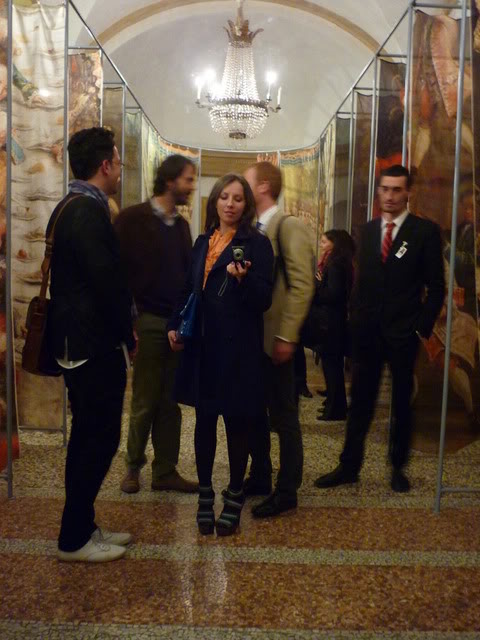
I picked up a little volume of poetry from a lovely bookshop in Krakow last weekend: Pound's Diptych Rome-London, which comprises 'Homage to Sextus Propertius' and ' Hugh Selwyn Mauberley'.
For some reason I've never really been able to get into The Cantos, but I saw this tiny book and thought I could handle two shorter Pound poems. It's such a shame that critics and commentators are so quick to draw the reader's attention to Pound's fascism - does this matter for our interpretation of his artistic output? Personally, I'm not interested in making retrospective moral judgements. I'm interested in understanding Pound's world through his poetry and seeing whether or not he has anything to say that resonates with or challenges how I view contemporary society.
Hence my fascination with his attack on what he viewed as the increasingly mindless and oppressive nature of American culture. I think it's interesting how little seems to have changed in some regard - to read the work of an artist so frustrated with the cultural society he found in his midst - and the channelling of that frustration into beautiful and provocative poetry.
Pound's critique of a culture which has lost sight of the value of craft in favour of the rapidity of mass produced visual images is in many ways just as relevant to 2010 as it was in 1917, when Pound wrote 'Mauberley'. I don't know enough about Pound and the rest of his writings to offer a more precise opinion, but I found this work to be particularly useful and thought-provoking over the course of a weekend spent reading Curtis White's excellent The Middle Mind and pondering the state of contemporary aesthetics.

Anyway, enough is enough. I leave you with (the very short!) 'II' from 'Mauberley' :
The age demanded an image
Of its accelerated grimace,
Something for the modern stage,
Not, at any rate, an Attic grace;
Not, not certainly, the obscure reveries
Of the inward gaze;
Better mendacities
Than the classics in paraphrase!
The "age demanded" chiefly a mould in plaster,
Made with no loss of time,
A prose kinema, not, not assuredly, alabaster
Or the "sculpture" of rhyme.
For some reason I've never really been able to get into The Cantos, but I saw this tiny book and thought I could handle two shorter Pound poems. It's such a shame that critics and commentators are so quick to draw the reader's attention to Pound's fascism - does this matter for our interpretation of his artistic output? Personally, I'm not interested in making retrospective moral judgements. I'm interested in understanding Pound's world through his poetry and seeing whether or not he has anything to say that resonates with or challenges how I view contemporary society.
Hence my fascination with his attack on what he viewed as the increasingly mindless and oppressive nature of American culture. I think it's interesting how little seems to have changed in some regard - to read the work of an artist so frustrated with the cultural society he found in his midst - and the channelling of that frustration into beautiful and provocative poetry.
Pound's critique of a culture which has lost sight of the value of craft in favour of the rapidity of mass produced visual images is in many ways just as relevant to 2010 as it was in 1917, when Pound wrote 'Mauberley'. I don't know enough about Pound and the rest of his writings to offer a more precise opinion, but I found this work to be particularly useful and thought-provoking over the course of a weekend spent reading Curtis White's excellent The Middle Mind and pondering the state of contemporary aesthetics.

Anyway, enough is enough. I leave you with (the very short!) 'II' from 'Mauberley' :
The age demanded an image
Of its accelerated grimace,
Something for the modern stage,
Not, at any rate, an Attic grace;
Not, not certainly, the obscure reveries
Of the inward gaze;
Better mendacities
Than the classics in paraphrase!
The "age demanded" chiefly a mould in plaster,
Made with no loss of time,
A prose kinema, not, not assuredly, alabaster
Or the "sculpture" of rhyme.




No comments:
Post a Comment